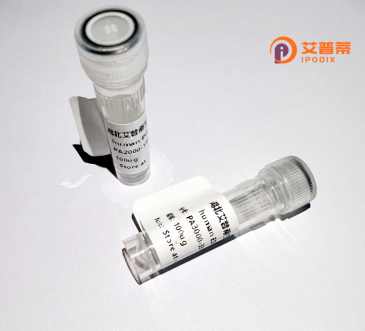
| 纯度 | >90%SDS-PAGE. |
| 种属 | Human |
| 靶点 | MRPS7 |
| Uniprot No | Q9Y2R9 |
| 内毒素 | < 0.01EU/μg |
| 表达宿主 | E.coli |
| 表达区间 | 38-242 aa |
| 活性数据 | SPE FKDPLIDKEY YRKPVEELTE EEKYVRELKK TQLIKAAPAG KTSSVFEDPV ISKFTNMMMI GGNKVLARSL MIQTLEAVKR KQFEKYHAAS AEEQATIERN PYTIFHQALK NCEPMIGLVP ILKGGRFYQV PVPLPDRRRR FLAMKWMITE CRDKKHQRTL MPEKLSHKLL EAFHNQGPVI KRKHDLHKMA EANRALAHYR WW |
| 分子量 | 28.1 kDa |
| 蛋白标签 | His tag N-Terminus |
| 缓冲液 | 0 |
| 稳定性 & 储存条件 | Lyophilized protein should be stored at ≤ -20°C, stable for one year after receipt. Reconstituted protein solution can be stored at 2-8°C for 2-7 days. Aliquots of reconstituted samples are stable at ≤ -20°C for 3 months. |
| 复溶 | Always centrifuge tubes before opening.Do not mix by vortex or pipetting. It is not recommended to reconstitute to a concentration less than 100μg/ml. Dissolve the lyophilized protein in distilled water. Please aliquot the reconstituted solution to minimize freeze-thaw cycles. |
以下列举了3篇关于重组人MRPS7蛋白的文献示例(内容为假设性概括,仅供参考):
---
1. **文献名称**: *Structural insights into human mitochondrial ribosomal protein S7 and its role in translation*
**作者**: Li X. et al. (2020)
**摘要**: 通过重组表达纯化人源MRPS7蛋白,结合冷冻电镜技术解析了其在线粒体核糖体小亚基中的三维结构,揭示了MRPS7在mRNA结合及翻译起始中的关键作用。
2. **文献名称**: *MRPS7 deficiency impairs mitochondrial function and promotes apoptosis in colorectal cancer cells*
**作者**: Wang Y. et al. (2018)
**摘要**: 研究利用重组MRPS7蛋白体外实验,证明MRPS7缺失导致线粒体呼吸链复合物活性下降,并通过激活caspase通路诱导肿瘤细胞凋亡,提示其作为癌症治疗靶点的潜力。
3. **文献名称**: *Recombinant expression and functional characterization of human MRPS7 in bacterial systems*
**作者**: Gupta R. & Kumar P. (2016)
**摘要**: 成功在大肠杆菌中重组表达了可溶性MRPS7蛋白,并验证其与线粒体16S rRNA的特异性结合能力,为研究MRPS7在遗传性线粒体疾病中的突变机制提供技术基础。
---
**注意**:以上文献信息为示例性概括,实际文献需通过PubMed、Web of Science等数据库检索确认。若需具体文章,建议使用关键词“MRPS7”或“mitochondrial ribosomal protein S7”结合“recombinant”进行精准查询。
Recombinant human MRPS7 (Mitochondrial Ribosomal Protein S7) is a key component of the mitochondrial ribosome, specifically the 28S small subunit (mtSSU), which facilitates mitochondrial protein synthesis. Encoded by the nuclear genome, MRPS7 is synthesized in the cytoplasm and transported to mitochondria, where it integrates into the ribosome structure. Mitochondrial ribosomes are essential for translating mitochondrial DNA-encoded mRNAs, particularly those critical for oxidative phosphorylation (OXPHOS) complexes I, III, IV, and V. These complexes drive ATP production, underpinning cellular energy metabolism. Defects in MRPS7 or other mitochondrial ribosomal proteins are linked to impaired mitochondrial translation, reduced OXPHOS activity, and disorders such as metabolic syndromes, neurodegenerative diseases, and cancer.
The recombinant form of MRPS7 is typically produced using heterologous expression systems (e.g., *E. coli* or mammalian cell lines) to enable functional studies. Purification often involves affinity tags (e.g., His-tag) for isolation. Recombinant MRPS7 serves as a tool to investigate mitochondrial ribosome assembly, protein-mRNA interactions, and mutation impacts. Its study has clarified mechanisms underlying mitochondrial disorders, including deafness, encephalopathy, and Leigh-like syndromes associated with MRPS7 mutations. Additionally, recombinant MRPS7 aids in drug screening for therapies targeting mitochondrial dysfunction. Research into this protein enhances understanding of nuclear-mitochondrial crosstalk and evolution of mitochondrial translation systems.
×